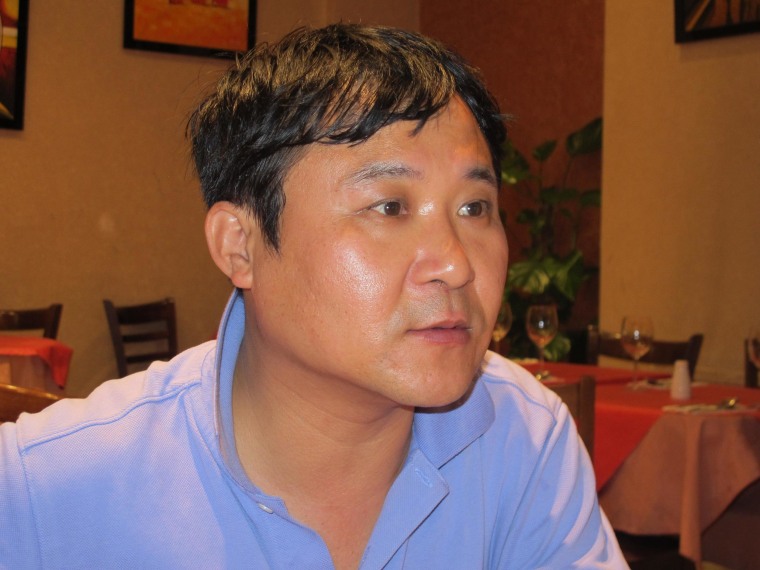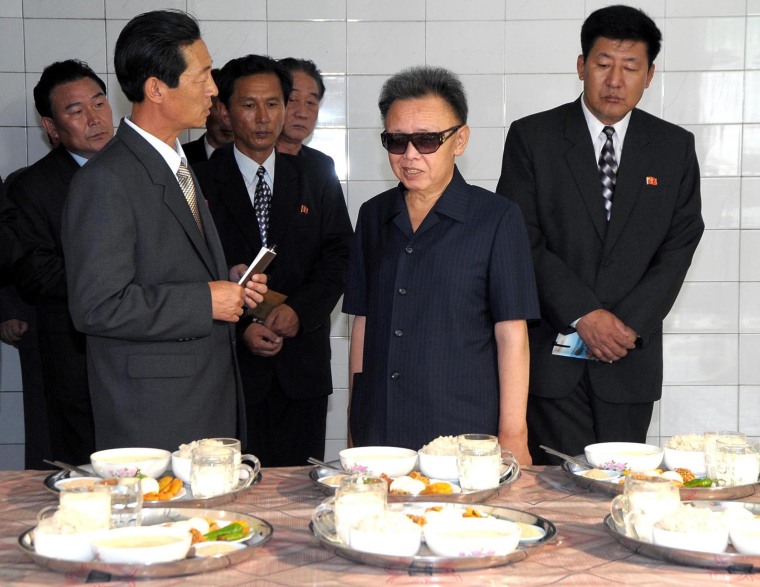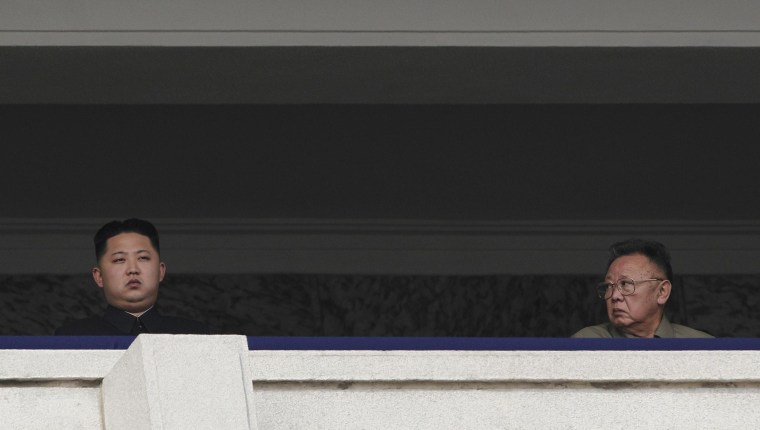In the late 1990s, Jang Jin-sung was North Korea’s state poet laureate and a spy.
He reached the pinnacle of his charmed life in 1999 when he met the "Dear Leader," Kim Jong Il, at the age of just 28.
Becoming one of Kim’s “Admitted” inner circle meant Jang was granted immunity from even the highest-ranking authorities and other privileges: a steady stream of food provisions (“spoils of war” as the North Koreans termed food aid packages from international aid agencies), special access to strictly censored publications, a travel pass within the country, even his own transport – a bicycle.
It all came to an end in 2004 when Jang was forced to flee his homeland.

"Dear Leader: Poet, Spy, Escapee — A Look Inside North Korea" is Jang’s story of transformation and his escape; it’s being published this month by Simon & Schuster. While almost everything Jang recounts about how the North Korean government works is unverifiable, it’s a remarkable account.
Below is the translation of an interview he gave NBC News’ Director of International News Adrienne Mong during a recent visit to London.
Q: What was your job?
In North Korea, I was a writer. But in North Korea there's no such thing as a writer the way the outside world understands it. It's not as an individual that you are a writer. It is as a bureaucrat, as a civil servant, as a revolutionary.
I was a part of the so-called United Front Department [the key division in the ruling Workers’ Party that was also responsible for inter-Korean espionage, policymaking and diplomacy]. My job title was counterintelligence officer with special oversight of psychological warfare against South Korea.
Q: So your position gave you a unique perspective on how the North Korean government functions?
When I was growing up, I didn't even think to question what we read and were taught. It was only when I became part of the system, writing over and over the story that I’d been taught as a child, that I realized it wasn't the truth. I realized it was policy that was forcing our history, our culture, and our identity to be written a certain way -- not because it actually happened this way.

Q: How does the North Korean government work?
The world today still thinks of North Korea as a military country, that the military is the most important entity. But that is completely incorrect. The only entity that actually matters when it comes to decision-making or policy-making is the Organization and Guidance Department (OGD), the executive branch of the Workers’ Party.
"Kim Jong Un doesn’t have that old boys’ network ... In North Korea, he’s alone. He has no alliances or factions or any clout"
All roads in North Korea lead to the OGD. If you go anywhere in North Korea, even at the lowest level -- a village, town, district, or residential neighborhood -- there is a party committee. This committee reports to the OGD. The OGD answered to one person, Kim Jong Il. The OGD has five functions. First, it is responsible for running the country and there are no competing channels. Second, it has the right to vet and appoint personnel who have any power to command. Third, it has the right to purge, execute, or monitor anyone; the secret police is directly run by the OGD. Fourth, any policy anyone wants to propose has to go through the OGD; there is no legislative body and Kim Jong Il signed off on every policy. Finally, the OGD is responsible for safeguarding the Kim family.
Q: Is this power structure sustainable?
The OGD is designed to support the authority of one man alone at the top. There is no No. 2 or No. 3 person. There are no factions. That’s why the OGD reinforces the authority of the Kim dynasty, the Kim sanctity, the Kim legitimacy. The statues, the propaganda, all that is maintained by the OGD. It doesn’t matter whether it’s sustainable; they don’t know how to maintain power any other way.
Q: What if Kim Jong Un is a weak leader? How does the OGD work then?
It's a structure that keeps it going no matter whether he has the power or not. That’s precisely why the OGD is so much more powerful now than before. When Kim Jong Il built up the OGD [to take power from his father Kim Il Sung], it was all Kim Jong Il’s friends, a network of his old friends. Kim Jong Un doesn’t have that old boys’ network. If he does, it’s in Switzerland. In North Korea, he’s alone. He has no alliances or factions or any clout, because he has no operational experience within the North Korean system the way his father had by the time he came to power.

Q: If so, wouldn’t someone in the OGD just take over if they already wield the real power?
That’s an interesting question. North Korean people live in a society that has been engineered especially for a Kim to be in power. Only the Kim family is considered the legitimate heirs. If another family came to power, that would cause fissures within the OGD system. These people know this better than anyone else; it’s in their interest to keep the system going as it is, to keep Kim Jong Un in the spotlight but to wield the real power behind the scenes.
Q: What do you think is the biggest misunderstanding of North Korea today?
North Korea needs to be seen in its own specific context. People tend to view how it works within the Soviet system or as some relic of Stalin or the Cold War. It’s not. It’s more of a cult-totalitarian state, i.e., a totalitarian system with a cult-building foundation. We need to stop applying Cold War or Soviet logic to a country that has a totally different historical background.
"North Korea needs to find blame for its own domestic power failures so the U.S. has been designated as a state enemy for that purpose"
Q: We tend to think that China is North Korea’s closest ally and has influence over North Korea. But when I was working in Beijing, that didn’t seem to be the view within the Chinese capital. How would you describe the relationship?
The Chinese have been so annoyed by North Korea and by Kim Jong Il personally ... China wants reform and opening. It has expectations for Kim Jong Un. But it’s going to be more pragmatic in its approach in how to deal with Pyongyang. Because to the Chinese, it’s, "we don’t want to go through what happened with Kim Jong Il, he was a pain." As for the North Korean leadership, it despises China. They believe, "The Chinese think they’re so great. They think they can determine Korea’s fate. We are not Chinese. We are Korean." So these guys don’t want to be holding hands with Beijing. They are more interested in developing their nuclear weapons to keep their status quo going. The last thing they would want is Chinese-style reform.
Q: What is the North Korean view of America then?
The so-called hatred towards America comes out of a pragmatic need. North Korea needs to find blame for its own domestic power failures so the U.S. has been designated as a state enemy for that purpose. But it’s not really anti-U.S. Think about it this way, every leader’s house is supposed to hang a portrait of Kim Il Sung, but in the end every leader’s household wants cash. And the U.S. dollar is what keeps the North Korean economy going. In order to justify a power system that does not reflect reality, you need an unrealistic enemy. And that’s the role the U.S. plays, the bogeyman.
Q: What has been the biggest adjustment living in the outside world, in South Korea?
The most difficult thing was to realize that while I had left that world of North Korea, I could not settle in the new world of South Korea, because I had left all my family and friends north of the Demilitarized Zone (DMZ). How could I live in a world empty of everyone I loved? The DMZ is a fence not just across land but also across the heart of every North Korean exile. We’re neither of this world or that world. If your heart is still in one place and you are in another, it’s hard to make a new life in a new place. So that was the most difficult decision I had to make: to accept that I am here, in South Korea, and begin anew.
Q: Describe to us your day-to-day now in South Korea. How do you go about life amidst possible threats from North Korea to stop you from talking?
My life is no different from that of normal people. I get up in the morning, go to work [at New Focus International, a website reporting on North Korea], come home for dinner with my family, etc. Of course, I have bodyguards and am always aware of the threat from North Korea .... I’m just so grateful to even be alive and to live another day. So I can’t waste it, because why did I escape, why did all of this happen so that I could have a happy life, if I don’t keep speaking the truth about North Korea?